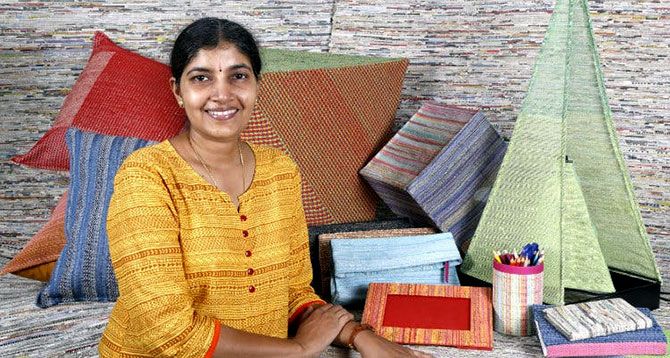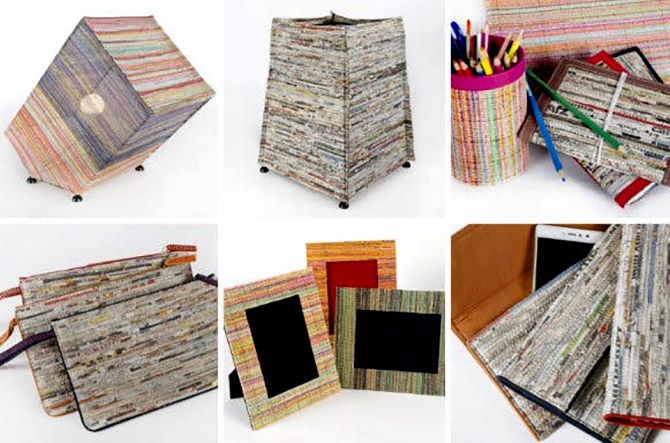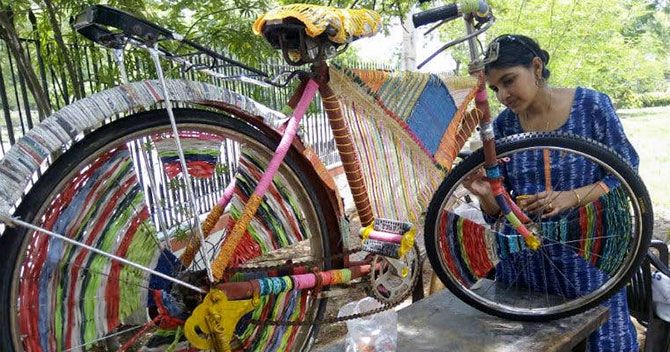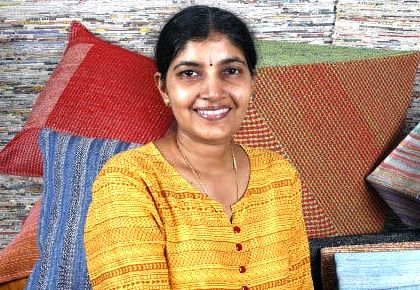Neerja Palisetty's Sutrakaar Creations combines paper with post-consumer waste to promote fair trade, craft empowerment, zero-waste, and ethical fashion.
This is her story.

Neerja Palisetty has always been passionate about paper.
"Paper is considered to be very fragile by the common man and I want to change that perception," the entrepreneur says. "Once woven, paper has immense potential; it’s a very strong and versatile material."
"Pulp (and paper) is the third largest industrial polluter of air, water and soil and I wanted to help avoid this," she says.
That’s how Palisetty started Jaipur-based Sutrakaar Creations, which focuses on eco-textile creations made from paper and natural materials as a step towards a sustainable future.
But perhaps it was destined to be.
Growing up among weavers
Neerja was born into a family of weavers in a small village in Srikakulam district, Andhra Pradesh. Ponduru is known for its fine khadi and cotton weaves. Almost every other house in Ponduru had a loom.
Growing up, it was no surprise that she gravitated towards weaving: she wove her first piece of yarn when a teenager.
"I was in Class VII or VIII when I first wove jute and cotton into yarn for a school project. I ended up making a small pouch for pencils," she says.
Neerja says her father, who had graduated as a textile designer from the first batch of the National Institute of Design, Ahmedabad, was a huge influence on her life.
"Influenced by him, I studied clothing and textiles during my graduate course at Maharaja Sayajirao University, Baroda. Later, I pursued a post-graduation course in higher education from Nottingham Trent University. Now, I have an experience of over 17 years working in the fashion industry and education sectors. But I owe all the textile design knowledge I have to my father," she says.
After her education, Neerja did various jobs -- she worked as a merchandiser at Tirupur in Tamil Nadu and as a design professor in Coimbatore and later Jaipur.
But Neerja lets on that through it all she remained fascinated by the art and technique of paper weaving.
"There are references to paper weaving in Japanese legends. I wanted to emulate these techniques in the Indian context to promote our traditions and create livelihood opportunities for weavers," she says.
Her own weaving studio was always a dream. Even while she presented research papers on sustainable design and sustainable textiles at various international conferences.
"I had the weaving studio on my mind from the time I graduated. However, life had different plans and my dreams took a backseat," Neerja recalls.
Starting Sutrakaar Creations

The experience she had garnered from her jobs gave her enough confidence to pursue her dream. And Sutrakaar Creations was born.
It is a studio focused on eco-textile creations made from waste paper, recycled paper, and natural materials.
"Our products are 100 per cent handmade and handcrafted, and with minimal use of electrically operated machines," she says.
"It is also an open space for experimental weaving and I have collaborated with a few international artists and designers to create artworks and installations," she adds.
Sustainable ideas
At Sutrakaar, her weavers cut waste paper into strips of 2 to 4mm, twist and hand-spin them over the charkha to make thread-like strings using adhesive. This is used as the weft; the warp is either cotton or Ahimsa silk, both recycled industrial waste.
Palisetty works with weavers, four looms (two big pedal looms and two smaller ones), and women for cutting and trimming, at her studio in Jaipur.
"I get more weavers if needed," she says.
Most raw material is sourced from paper export houses and kabadiwalas.
The "80 per cent upcycled" waste yarn is fashioned into accessories like pouches and handbags, gifting items such as diary covers and photo frames, and home decor accents such as lampshades and room dividers. Prices range between Rs 850 and Rs 10,000.
"The idea is to juxtapose crafts with post-consumer waste so that we promote fair trade, craft empowerment, zero-waste and ethical fashion," Neerja says.
Supporting locals, making profits

Neerja now takes orders over Facebook and worldartcommunity.com, a peer-to-peer online marketplace. She also displays and sells Sutrakaar products at exhibitions.
Speaking about how Sutrakaar Creations has grown over the past year, she says the growth has not been tremendous, but it has been steady.
"I am able to provide employment to housewives and local weavers. I started with one weaver and today I have three weavers and five housewives. People in India and abroad have heard about our products and are keen to understand the process," she says.
She says the experience has been very positive.
"When I explain to people on how we create what we create with an entirely unheard-of raw material, people are keen to understand and learn more," Palisetty says.
The recycling and upcycling of paper
With people -- especially millennials -- becoming environmentally conscious and keen to help save the earth, interest in environmentally relevant brands is at an all-time high.
"Our brand provides a one-of-a-kind solution; not just our products, our process is also eco-friendly and sustainable," she says.
In an article on an online portal, she wrote: "My dream is to educate more people globally to follow a sustainable lifestyle. My husband has now joined me in my work. This is our contribution to saving the earth for future generations."
Neerja states she and Sutrakaar remain committed to driving change by designing socially and environmentally conscious products that embody vibrant, edgy, and smart sophistication.
"We ensure that we protect traditional techniques by incorporating them in contemporary designs. A few of our products are 90 per cent biodegradable. And through our creations I can see we have created a small ripple in this ocean and hope to create a gigantic wave," she says.













 © 2025
© 2025